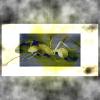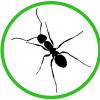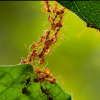Is it really true that boosted tetramorium will turn against the queen that's not there mom? I'd love to know more about this.
Long story short, but someone was selling me an ant colony and he said it was (different ant genera/species), but in retrospect it was Tetramorium (not that he realized this).
Anyway he said he had brood boosted the queen. The day I met him to buy the colony, he said that the queen was now missing legs because the boosted workers had abruptly turned on the queen! The workers thereafter seemed to calm down, but heck would you trust them after such a thing happened?
I didn't buy that colony (thank goodness), though I did buy his second smaller colony for way too much money for what turned out to be Tetramorium.
(Anyway I was a newb to modern ant-keeping then, which is why I didn't realize what those ants were, though I was puzzled because the workers didn't look like (stated genera/species). And that Tetra colony did get traded later so it kinda worked out.)
Edited by OhNoNotAgain, May 18 2021 - 9:53 AM.
Past & Present
Veromessor pergandei, andrei, stoddardi; Novomessor cockerelli
Camponotus fragilis, Camponotus sansabeanus (inactive), vicinus, laevigatus/quercicola, CA02
Pogonomyrmex subnitidus, P. californicus (inactive)
Liometopum occidentale (inactive); Prenolepis imparis; Myrmecocystus mexicanus (inactive); Tetramorium sp. (inactive); Lasius sp.
Termites: Zootermopsis angusticollis, and a box of drywood termites that can't be seen
Isopods: (most no longer keeping) A. gestroi, granulatum, kluugi, maculatum, vulgare; C. murina; P. hoffmannseggi, P. haasi, P. ornatus; V. parvus, P. pruinosus, T. tomentosa
Spoods: (no longer keeping) Phidippus sp., other





















